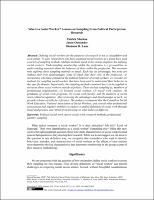Please use this identifier to cite or link to this item:
https://hdl.handle.net/20.500.12202/9509Full metadata record
| DC Field | Value | Language |
|---|---|---|
| dc.contributor.author | Meehan, Patrick | - |
| dc.contributor.author | Ostrander, Jason | - |
| dc.contributor.author | Lane, Shannon R. | - |
| dc.date.accessioned | 2023-11-21T21:17:24Z | - |
| dc.date.available | 2023-11-21T21:17:24Z | - |
| dc.date.issued | 2022 | - |
| dc.identifier.citation | Meehan, P., Ostrander, J., & Lane, S. R. (2022). Who is a social worker? Lessons on sampling from political participation research. Advances in Social Work, 22(1), 1-13. https://doi.org/10.18060/25650 | en_US |
| dc.identifier.issn | 1527-8565 | - |
| dc.identifier.uri | https://journals.iupui.edu/index.php/advancesinsocialwork/article/view/25650/24291 | en_US |
| dc.identifier.uri | https://hdl.handle.net/20.500.12202/9509 | - |
| dc.description | Scholarly article / Open access | en_US |
| dc.description.abstract | Defining social workers for the purposes of research is not as straightforward as it sounds. To date, researchers who have examined social workers as a group have used a variety of sampling methods. Multiple methods speak to the variety of options for defining social workers. Understanding membership within the profession is a precondition to understanding research about the behavior of those within the profession. This research note explores these sampling methods in detail. Each has its advantages, but none are without their own disadvantages, some of which bias their view of the profession. As researchers who have considered the political behavior of social workers, we consider six methods for sampling social workers that have been used to understand their behavior in this specific domain. Importantly, the sampling methods examined here can be applied to research about social workers outside of politics. These include sampling (1) members of professional organizations, (2) licensed social workers, (3) social work students, (4) graduates of social work programs, (5) social work faculty, and (6) members of social work-related occupations. After reviewing the advantages and disadvantages of each, we provide scholars a table for reference. The authors recommend that the Council on Social Work Education, National Association of Social Workers, and several other professional associations pull together members to explore a unified definition of social work through integrated practice and refrain from focusing on what makes us different. | en_US |
| dc.language.iso | en_US | en_US |
| dc.publisher | Indiana University School of Social Work | en_US |
| dc.relation.ispartofseries | Advances in Social Work;22(1) | - |
| dc.rights | Attribution-NonCommercial-NoDerivs 3.0 United States | * |
| dc.rights.uri | http://creativecommons.org/licenses/by-nc-nd/3.0/us/ | * |
| dc.subject | political social work | en_US |
| dc.subject | macro social work | en_US |
| dc.subject | research methods | en_US |
| dc.subject | professional identity | en_US |
| dc.title | Who is a social worker? Lessons on sampling from political participation research | en_US |
| dc.title.alternative | Who is a social worker? Lessons on sampling from political participation research. | en_US |
| dc.type | Article | en_US |
| dc.identifier.doi | https://doi.org/10.18060/25650 | en_US |
| dc.contributor.orcid | 0000-0002-6337-2712 | en_US |
| local.yu.facultypage | https://www.yu.edu/faculty/pages/lane-shannon | en_US |
| Appears in Collections: | Wurzweiler School of Social Work: Faculty publications | |
Files in This Item:
| File | Description | Size | Format | |
|---|---|---|---|---|
| Lane_Meehan_et_al_25650_Who_Is_A_SWker OA.pdf | 371.39 kB | Adobe PDF |  View/Open |
This item is licensed under a Creative Commons License

